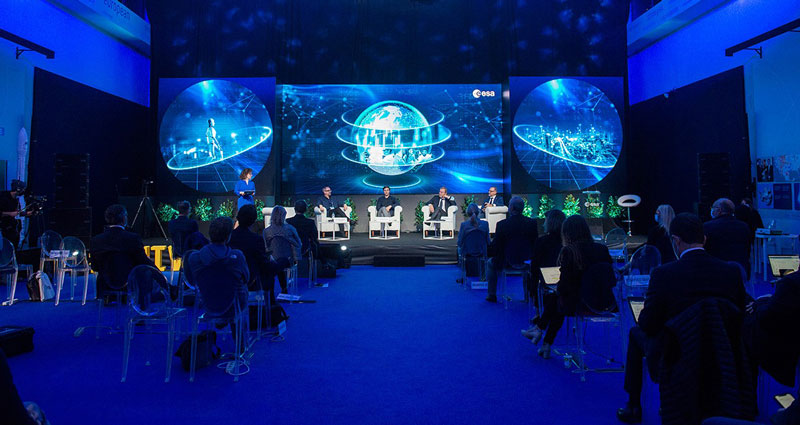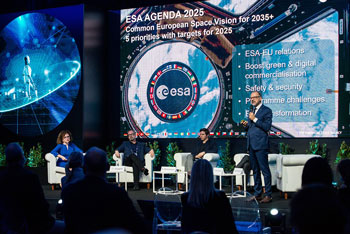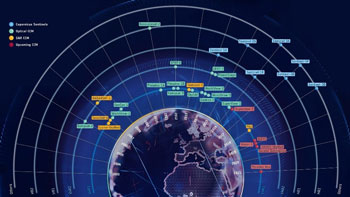- News
- Phi-week Triumphs
Φ-Week Triumphs
25 Oct 2021

The Φ -lab concept, launched in 2017, aims to accelerate the future of Earth Observation (EO) by means of transformational innovations, which are able to completely change or create entire industries via new technologies, with the goal to strengthen the world-leading competitiveness of the European EO industrial and research sectors.
There were over 3,800 registered attendees from 91 countries at Φ-week 2021, with 17 main sessions and around 190 supplementary items throughout the week.
The event this year focused on EO New Space, and the theme was covered comprehensively over the course of the five days. Key sessions took up the subjects of enabling technologies, European access to space and accelerating New Space uptake. Smallsats were also discussed in detail, including both ESA SCOUT and other EO missions based on CubeSat platforms.
The main features included that of the support topic of Digital Twin Earth. A group of European scientists in 2020 had put forward their ideas on the practical implementation of Digital Twins and the potential application areas for a Digital Twin Earth in the real world—a dynamic, digital replica of our planet, which accurately mimics Earth’s behaviour.
Constantly fed with Earth observation data, combined with in situ measurements and artificial intelligence, Digital Twin Earth will help visualise and forecast natural and human activity on the planet. The model will be able to monitor the health of the planet, perform simulations of Earth’s interconnected system with human behaviour, and help support European environmental policies.

In September 2020, ESA launched several Digital Twin Earth Precursor Activities to explore some of the main scientific and technical challenges in building a digital twin of Earth.
This year, the experts came forward with the results of the activities over the last year, covering the fields of agriculture and Food Systems; Hydrology; Climate Impacts; Forest Systems and exploring the potential of artificial intelligence to forecast oceanic events.
Furthermore, with a boom in the global market for Earth observation information and data products, participants at this year’s conference dug deep into the ‘market perspective’. This important topic includes how to gain a better understanding of what governments, industry, the public and other users of Earth observation products and services need and expect to create value for society and the economy.
Speakers delivered an extremely positive view of the future Earth observation market with emerging new verticals, while environmental, social and governance (or ESG) criteria are also increasingly important to companies, their investors and other stakeholders.
While ESG certification picks up pace, the growth in Europe’s market for Earth observation is also closely linked to the European Commissions’ Green Deal – which aims to transform the EU into a modern, resource-efficient and competitive economy, ensuring no net emissions of greenhouse gases by 2050.

There were other moves towards blending traditional Earth observation with business initiatives. For example, ESA just signed a contract with ICEYE, a commercial provider of satellite radar imagery, to include their constellation of small satellites in the fleet of missions contributing to Europe’s Copernicus environmental monitoring programme—a perfect example of New Space.
Last but not least, this Phi-Week edition witnessed the signing of a contract with the German Research Centre for Artificial Intelligence, to support a new development initiative focused on artificial intelligence for Earth Observation.
Pierre Philippe Mathieu, Head of the Φ-lab Explore Office, emphasises that, “The Φ-week has illustrated some of the challenges and opportunities related to the use of new technologies, such as AI, to make the most of EO data.
“In particular, AI is a very powerful tool to find hidden patterns and connections in big data sets, but there is a critical need for domain expertise in order to interpret such correlations (e.g., check if they are underpinned by physical meaning) and understand their scope of application (e.g. can the AI prediction be generalised on new data sets that were not used for training the algorithm).
“In this context, the InCubed activity with DFKI aims to create an unique rapid prototyping environment whereby AI experts and domain experts meet and interact to rapidly test, benchmark and iterate on innovative EO-based solutions and commercial services meeting the evolving needs of big corporate users. It is at this "dynamic intersection" of data, technologies and domain and user expertise that the magic happens!”, concluded Mathieu.